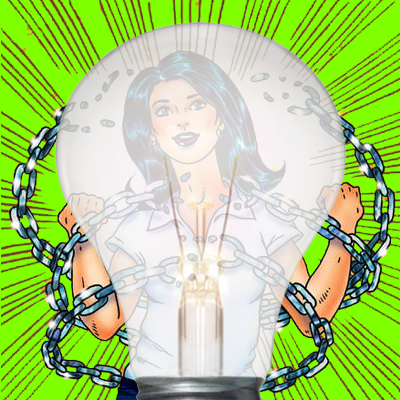 In the Draughty Old Fen last night, I didn't see many more houses in the dark than the number of people who are usually out on a Saturday evening leave behind. The reason I was looking was that Earth Hour took place from 8.30-9.30, during which people who believe the theory that the activities of humankind are causing our climate to change were told to leave their lights off to make "a call to stand up, to take responsibility, to get involved and lead the way towards a sustainable future".
In the Draughty Old Fen last night, I didn't see many more houses in the dark than the number of people who are usually out on a Saturday evening leave behind. The reason I was looking was that Earth Hour took place from 8.30-9.30, during which people who believe the theory that the activities of humankind are causing our climate to change were told to leave their lights off to make "a call to stand up, to take responsibility, to get involved and lead the way towards a sustainable future".If so, Earth Hour fell at the first hurdle. In the words of the Daily Telegraph:
Even if power stations are turned off, the upsurge in turning the lights back on one hour later will require power stations that can fire up quickly like oil and coal.Any chess player understands the principle of making an immediate sacrifice for a future gain, but if the WWF (World Wildlife Foundation) and its Green fellow-travellers were really into long-term thinking, they wouldn't have campaigned for decades against the cleanest proven source of large amounts of energy around: nuclear power. Because the protests of a tiny minority of vocal vested interests were heeded, Great Britain now has only 19 nuclear reactors, and the new generation, commissioned only last year, won't be ready to fire up until 2020, if there aren't yet more objections.
Energy experts said it could therefore result in an increase in carbon emissions "rendering all good intentions useless at a flick of a switch".
But WWF said the campaign was about raising awareness and saving energy in the long term, rather than a short-term fix.
I was interested to see a night-time satellite image of South Korea taken du
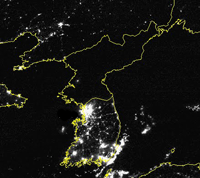 ring Earth Hour on Anthony Watts' Watts up with That blog, showing the country's towns as lit up as on any other night, while on the north of the border a Communist dark age still exists.
ring Earth Hour on Anthony Watts' Watts up with That blog, showing the country's towns as lit up as on any other night, while on the north of the border a Communist dark age still exists.I am concerned that in our still-free societies there are those who would like to lead us into such a dark age and, although little that justice-and-peace types say surprises me, I was shocked last year to be invited to "fast" from the lights in my house from Ash Wednesday so that I and my family would appreciate God's gift of light on Easter Sunday. Was it coincidence that this was also the time of the changeover from real lightbulbs that have served us well from Edison's time to the pathetically poor energy-saving bulbs that don't even light up when you switch them on?
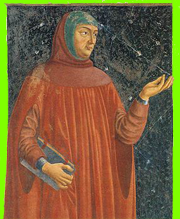 Suite 101's Paula Stiles identifies the term Dark Ages as having originally been coined by the Italian Renaissance poet Petrarch, who "appears to have used the term to describe the 5th to 14th centuries in protest at the relentless denigration of ancient pagan religion by Christian writers during this period."
Suite 101's Paula Stiles identifies the term Dark Ages as having originally been coined by the Italian Renaissance poet Petrarch, who "appears to have used the term to describe the 5th to 14th centuries in protest at the relentless denigration of ancient pagan religion by Christian writers during this period."Bertrand Russell, in his A History of Western Philosophy, doesn't link Petrarch with the phrase, but places the conception of the modern era at the Renaissance (in a chapter entitled The eclipse of the Papacy), and vents his anger on the Fathers of the Church, with special bile reserved for St Augustine, whose death was roughly contemporaneous with the final decomposition of the Roman Empire:
It is strange that the last men of intellectual eminence before the dark ages were concerned, not with saving civilization or expelling the barbarians or reforming the abuses of the administration, but with preaching the merit of virginity and the damnation of unbaptized infants. Seeing that these were the preoccupations that the Church handed on to the converted barbarians, it is no wonder that the succeeding age surpassed almost all other fully historical periods in cruelty and superstition.(It should be said that Russell lets his prejudice - and western ethnocentrism - trump his erudition here: one could say that the rump Roman Empire, as the Byzantine civilisation centred on Constantinople, survived happily into mid-Renaissance times until destroyed by Sultan Mehmed's Ottoman army in 1453).
But how dark were the dark ages? If the past is another country, we would be ethnocentric ourselves to blame other civilisations for not undergoing the explosion of progress that has marked ours since, say, the invention of the steam locomotive by William Murdoch and James Watt in the late 18th century. But the early medieval period was not short of eureka moments in many fields.
In 1150, for example, the Knights Templar sowed the seeds of modern capitalism by inventing the "letter of credit" - which would evolve into the cheque - that allowed a
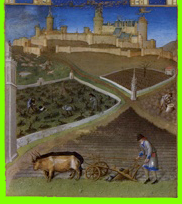 pilgim to deposit funds in one place and redeem them in another far away.
pilgim to deposit funds in one place and redeem them in another far away.Shortly afterwards, the arbitrary power of absolute monarchs was dealt a fatal blow by the Magna Carta, signed in England in 1215. Around the same time, Franciscan Friar Roger Bacon would initiate the scientific method by making a hypothesis, testing it and then refining it further if it passed the test; if not, moving on to another hypothesis - one of his experiments was on the ancient remedy of ground willow bark to treat fever and pain, which would be built on by French chemist Charles Frederic Gerhardt to synthesize Aspirin in 1853.
Underpinning both of these - and much else - was the novel addition of wheels to the plough in the 6th century (abo
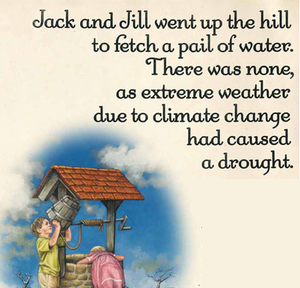 ve), allowing it to increase in weight and till more and heavier soil, allowing populations to increase and create more pressure for innovation.
ve), allowing it to increase in weight and till more and heavier soil, allowing populations to increase and create more pressure for innovation.But now we have a movement of groups of activists, supposedly informed by science, to stifle any innovation that they do not approve of, and allow only research that saves the appearances of anthropogenic climate change/global warming, which is being shoved down the throats of our children and young people in education and leisure. Case in point: energy secretary Ed Milliband commissioned adverts promoting the theory of anthropogenic climate change as fact and using nursery-rhymes to do so, only (thank God) to have them banned by the Advertising St
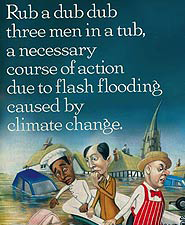 andards Authority on he grounds that the clear implications of the ads weren't supported by science. Milliband had obviously studied his Jesuit educational theory: "give me the child for his first seven years..."; but at least the lights are still on in the ASA.
andards Authority on he grounds that the clear implications of the ads weren't supported by science. Milliband had obviously studied his Jesuit educational theory: "give me the child for his first seven years..."; but at least the lights are still on in the ASA.The Telegraph's Murray Wardrop reports that earth is said to be entering a new period of geological time due to the acts of humankind having an indelible effect on old Gaia. Eugene F Stoermer of the University of Michigan's Center for Great Lakes and Aquatic Sciences places the handover from the present Holocene era to the putative Anthropocene at the end of the 18th century and "James Watt's invention of the steam engine" - William Murdoch obviously having gone the same way as Alfred Wallace, Friedrich Engels and woogie.
Last night I marked Earth Hour by having every light in the house switched on - except Maxima's room, as our cat Magus was curled up sleeping on her duvet. It was no mere excercise in contrarianism - we need a symbol of our desire to keep the lights on in science, and in our hard-won freedoms of conscience and expression.
To allow a Dark Age of fluffy earth-worship to be imposed would necessitate abuses of knowledge and wisdom that would have horrified the followers of the Old Religions whose torches were finally extinguished by the so-called Enlightenment's genteel patrician oppression; and the population control measures needed for proposed swingeing cuts in carbon dioxide (a gas necessary for all life on earth) would make the Holocaust look like a practice session. And guess what? It woul
 dn't be the lives of hand-wringing liberal intellectuals that were demanded.
dn't be the lives of hand-wringing liberal intellectuals that were demanded.Come next Earth Hour, my electricity meter will be working as hard as ever and for a good cause. When the time comes, I heartily commend Damian Thompson's advice to you: "Beat the 'Earth Hour' fascists and turn on your lights NOW!"











I think what struck me from your analysis is the way you seem to equate waste with progress and / or freedom.
ReplyDeleteHaving dark nights isn't such a bad thing actually Dougal.
Light you can see from space is wasted light, it's shining upwards and not lighting anything up and because of this wasted light, we never get to see the stars now. I don't see how you can claim that represents progress or freedom.
Up here in Norfolk they are planning to turn the street lights off at night to save money. Personally I'm looking forward to it, the sight of empty streets floodlit by endless street lamps is a pointless monument to waste.
Fair point, Derek. I don't equate waste with freedom at all - I would note that I never contributed to the presumably massive strain on power-stations caused by earth-hour protestors suddenly putting on their lights etc at 9.30pm.
ReplyDeleteYou have a good point about the streetlights, it is sad not to see the stars through light pollution. In most of Cambridgeshire, when streetlights are clapped out they are replaced by others that shine only downwards - but the struggle to get a failing streetlight replaced is a thing to behold, at least hereabouts. If streetlights are to be switched off late at night, I hope police patrols at those times will be upped to decrease the danger to pedestrians walking home from parties, etc.
I resent being told to do things like observe earth-hour by people who use phrases like "the debate is over" or "the science is settled" (I have heard both) as a figleaf to disguise the scientific bankruptcy of their cause. That's why I had my lights on during earth hour: if anybody thinks I have harmed the Earth, whose climate has been changing for four billion years, they are free to sue me and see if the standard of scientific reason they produce can pass muster in court.
I liked your site - especially the "Goldfingy" video!